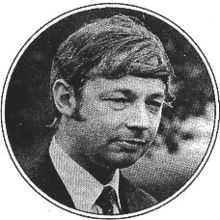David L. Clarke
From Wikipedia, the free encyclopedia
| David L. Clarke | |
|---|---|
 | |
| Born | October 3, 1937 |
| Died | June 27, 1976 (aged 38) |
Clarke studied at Peterhouse, Cambridge, where he became a fellow in 1966. His teaching and writing, particularly in analytical archaeology in 1967, transformed European archaeology in the 1970s. It demonstrated the importance of systems theory, quantification, and scientific reasoning in archaeology, and drew ecology, geography, and comparative anthropology firmly within the ambit of the subject. Never really accepted by the Cambridge hierarchy, he was nevertheless loved by his students for his down-to-earth, inclusive attitudes toward them.
Clarke died in 1976 as a result of thrombosis arising from a gangrenous twisted gut.[2]
Works
- Clarke, David L. (1968). Analytical Archaeology. Methuen. ISBN 0-416-42850-9.
- Clarke, David L. (1972). Models in Archaeology. London: Methuen. ISBN 0-416-16540-0.
- Clarke, David L. (1977). Spatial Archaeology. Boston: Academic Press. ISBN 0-12-175750-1.
- Clarke, David L. (1979). Analytical Archaeologist: Collected Papers of David L. Clarke. Boston: Academic Press. ISBN 0-12-175760-9.
References
External links
- Quote from David Clarke, from his 1973 article in Antiquity called The Loss of Innocence. Antiquity 47:100.
- Guidi, Alessandro (September 1, 1998). "Clarke in Mediterranean Archaeology : David Clarke's 'Archaeology : The Loss of Innocence' (1973) 25 Years After". Antiquity 72 (277): 678–680. ISSN 0003-598X.
|
This article is issued from Wikipedia. The text is available under the Creative Commons Attribution/Share Alike; additional terms may apply for the media files.